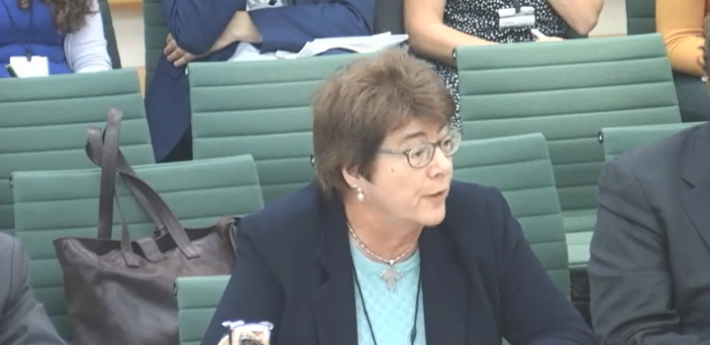BES President Sue Hartley gives evidence to the Environmental Audit Committee
Professor Sue Hartley gives evidence on behalf of the BES on innovative land management techniques and rewilding.

As part of their ongoing inquiry into The Future of the Natural Environment after the EU Referendum, the House of Commons Environmental Audit Committee called the British Ecological Society to give oral evidence on 18 October, for a session focused on innovative land management techniques and rewilding. The other panelists included Sir Charles Burrell, Chair of Rewilding Britain, Professor Richard Brazier from University of Exeter, and Dr Keith Kirby from the University of Oxford. You can read our full written inquiry response or watch a recording of the session. Thank you to all of our members that contributed to our response; it was quoted by the Committee on a number of occasions.
Rewilding – a contested term?
To open the session, the Committee inquired as to why we had stated in our written evidence that rewilding is a contested term. Professor Hartley pointed out there are still a number of definitions for rewilding in the scientific literature. No single definition has been settled on and currently rewilding can mean different things depending on where in the world you live and what you hope it will achieve. That said, the panel at the inquiry did were in broad agreement that rewilding refers to a range of techniques and approaches that seek to restore natural processes and ecosystem functions with the long term goal towards reduced human intervention through active management.
Rewilding’s evidence base
The lack of clear definition of rewilding is not surprising since the term is still being debated and the evidence base is currently limited (although growing). The scientific literature is still largely dominated by essays and opinion pieces rather than empirical studies. And as the number of practical rewilding projects is small, the impacts of such projects are difficult to gauge without control data. We need more experimental projects to gather evidence across a greater range of habitat types.
Rewilding versus ecological restoration
Rewilding approaches have generally employed methods drawn from the more established field of ecological restoration. But as we heard from Professor Hartley, rewilding could go beyond the restoration of ecosystems towards enhancing their function and process. Therefore, while the evidence remains uncertain, rewilding could also play an important role in landscape scale management, potentially providing ecosystem services, such as flooding regulation, water quality and recreation, in a more cost-effective approach than we have taken recently. To help facilitate this, Sir Charles Burrell indicated it would be beneficial to allow land owners and managers to trial land management techniques for longer, intergenerational periods of time, such as 25 years.
Integrated land management
However, the panel (and subsequent panel drawn from the agricultural sector), all agreed that to make the most of the potential benefits rewilding could offer, management of agricultural and natural environments needs to be truly integrated, and led by a clear, long term, vision. In England, this could be provided for by the 25-year plan for the natural environment, in conjunction with the 25 year plan for food and farming. These plans provide the opportunity to seek wide consultation and stakeholder engagement in order to define a vision for the countryside. In addition, natural capital provides a framework for landscape scale management and the Natural Capital Committee may offer an opportunity to integrate government work streams.
Shifting farming subsidies towards payments for ecosystem services
When asked if farming subsidies should be redirected to rewilding, Professor Hartley referred to evidence within our written response and suggested a future agri-environment funding mechanism could shift the balance from income support towards payment for ecosystem services. Ecosystem services provided through some rewilding techniques could provide benefits to agricultural services and could potentially offset intensification in other areas. Therefore, within the context of an overall shift towards payment for ecosystem services, rewilding could have a role to play. This will require the more holistic approach to land management mentioned above as well as a different approach to agriculture by allowing more flexibility to landowners to reach an agreed outcome.
To keep up to date with the inquiry follow our blog and twitter. If you are interested in Brexit and the environment why not explore our online resources, including an environmental ‘Question Time’ event exploring and some key steps on how to make Brexit work for ecology.
Like what we stand for?
Support our mission and help develop the next generation of ecologists by donating to the British Ecological Society.